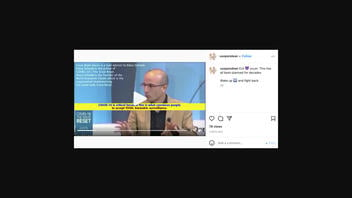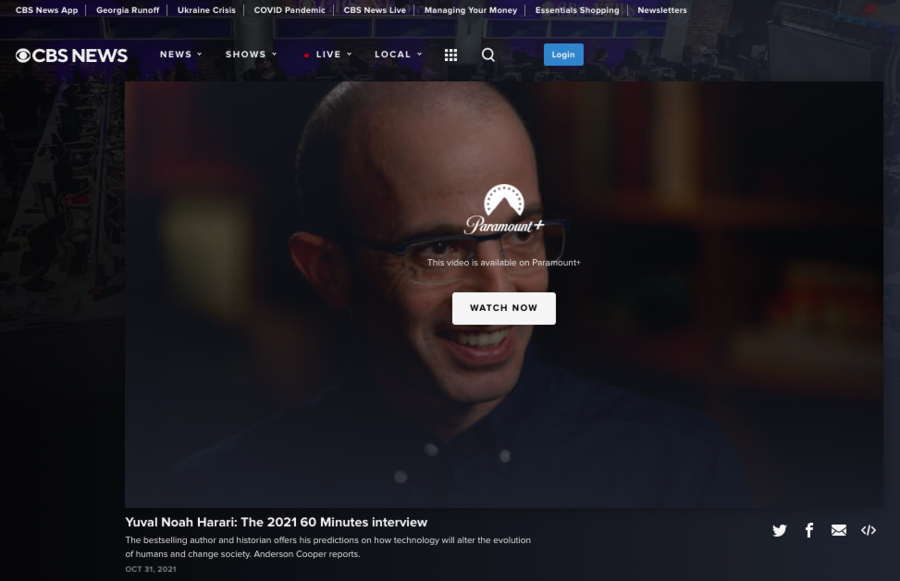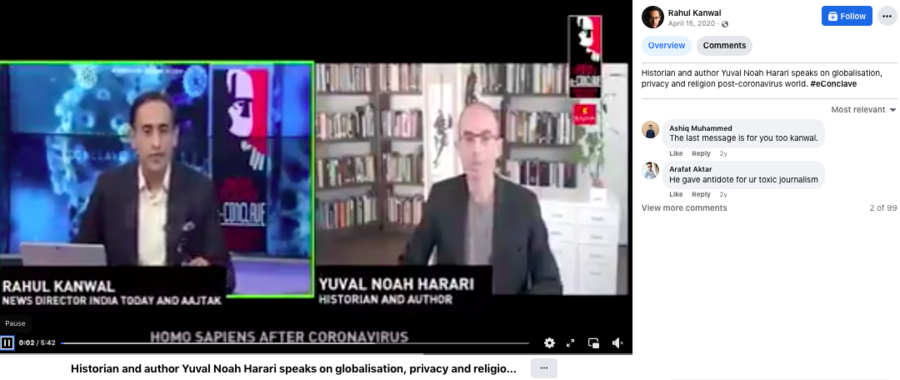

Does this video compilation of Yuval Noah Harari, a best-selling author and a professor at the Hebrew University of Jerusalem, show him celebrating plans for dystopian mass surveillance? No, that's not true: Harari often warns that humankind is at risk of being dominated by surveillance and artificial intelligence. He speaks and writes about these threats and does not welcome or celebrate them.
The claim appeared on Instagram on December 7, 2022. The caption says:
usopendean Evil 👿 scum. This has all been planned for decades.
Wake up 🆙 and fight back.
offers his predictions on how technology will alter the evolution of humans and change society.
What we have seen so far. It's corporations and governments collecting data about where we go, who we meet, what movies we watch. The next phase is surveillance going under our skin.
Here is part of the transcript of the interview that put his words into context even while they joke about the KGB. it starts with narration by Cooper:
Harari is concerned the pandemic has opened the door for more intrusive kinds of data collection, including biometric data.
Then part of the interview:
Anderson Cooper: What is biometric data?
Yuval Noah Harari: It's data about what's happening inside my body. What we have seen so far. It's corporations and governments collecting data about where we go, who we meet, what movies we watch. The next phase is surveillance going under our skin.
Anderson Cooper: I'm wearing a, like a tracker that tracks my heart rate, my sleep. I don't know where that information is going.
Yuval Noah Harari: You wear the KGB agent on your wrist willingly.
Anderson Cooper: And I think it's benefiting me.
Yuval Noah Harari: And it is benefiting you. I mean, the whole thing is that it's not just dystopian. It's also utopian. I mean, this kind of data can also enable us to create the best health care system in history. The question is what else is being done with that data? And who supervises it? Who regulates it?
The next clip, in the compilation, the third of four, is an interview by Rahul Kanwal, a journalist and news director for India Today.
On the clip in the compilation there is a graphic in the upper left-hand corner that says:
The Global COVID-19 Pandemic was declared on March 11, 2020
This interview was conducted on April 14, 2020
Kanwal posted a video clip from the interview on his Facebook account on April 15, 2020. The India Today video doesn't have the above graphic or any of the additional graphics seen in the compilation. The Facebook caption says:
Historian and author Yuval Noah Harari speaks on globalisation, privacy and religion post-coronavirus world. #eConclave
This is what it looked like at the time of writing:
(Source: Facebook screenshot taken on Fri Dec 9 21:32:51 2022 UTC)
It's part of the 45-minute live interview conducted on Zoom that was posted on India Today's website.
In the compilation clip at 0:36 Harari says:
We've now seen mass surveillance systems established even in democratic countries which previously rejected them and we also see a change in the nature of surveillance. Previously, surveillance was mainly above the skin now it's going under the skin. Governments want to know not just where we go or who we meet. But above all they want to know what's happening under our skin. What's our body temperature? What's our blood pressure? What is our medical condition?
But in the original video, this clip follows a question by Kanwal at 9:06:
Professor, this virus has seen several short-term emergency measures being implemented which were completely inconceivable just a few weeks ago. Which of these short-term emergency measures do you believe are likely to become a permanent feature of our lives going forward?
Harari's answer starts at 9:23:
The most likely and dangerous measure is surveillance. We've now seen mass surveillance systems established even in democratic countries which previously rejected them and we also see a change in the nature of surveillance. Previously, surveillance was mainly above the skin now it's going under the skin. Governments want to know not just where we go or who we meet. But above all, they want to know what is happening under our skin. What's our body temperature? What's our blood pressure? What is our medical condition? This is of course necessary to deal with the epidemic. But if this remains in the long run there is a danger of establishing new unprecedented totalitarian regimes.
Lead Stories has not received a response to its email request to Harari about the claim that he supports mass biometric surveillance. When he replies, this article will be updated accordingly.
This use of videos in a false context is similar to this recent debunk by Lead Stories.

















